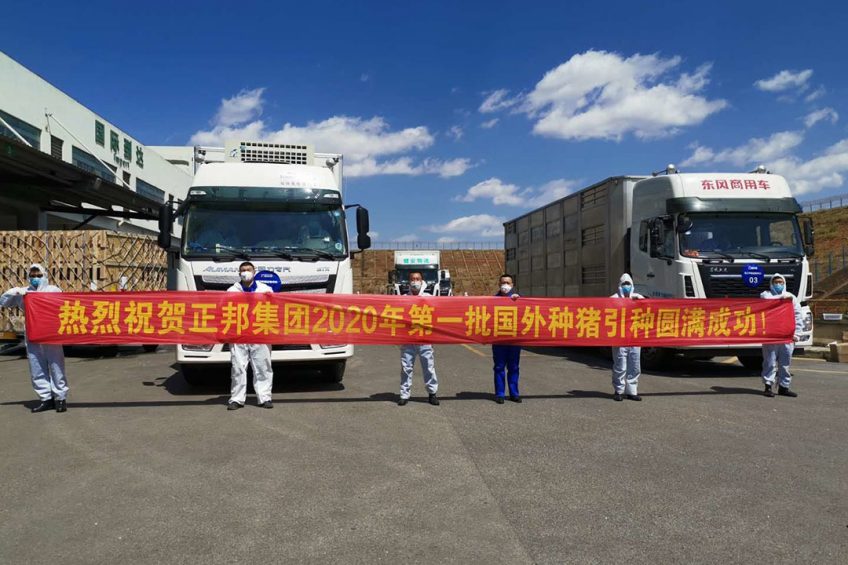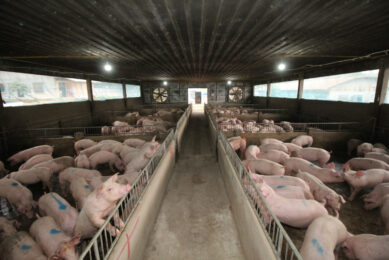Planes full of breeding pigs head to China

The golden age for breeding organisations appears to have started. The Chinese pig industry will leave no stone unturned to get back to business, which was halved due to African Swine Fever.
Insatiable – that is how China’s current hunger for breeding pigs has been described. It is educated guesswork, but insiders speak of as many as 10 million F1 gilts needed. What can be said for sure, however, is that the repopulation of Chinese pig houses has definitely taken off – with France playing a pivotal role, as that is where most long-haul flights with breeding pigs depart from. The country traditionally maintains good international relationships – to the profit of the French-based genetics companies.
Axiom sent four planes
For instance, the French breeding organisation Axiom has already sent four planes, carrying a total of 3,600 breeding pigs, to China. The next shipment plane leaves mid-May. The Dutch-Norwegian breeding company Topigs Norsvin is also involved, having shipped 500 boars to China from a nucleus farm in France, aimed for their Chinese partner.
Nucléus
Another genetics supplier is the French company Nucléus. Its export manager, Julien Rogon, explains that the company has already shipped 1,000 breeding animals to China this year. Because of Covid-19, air travel has reduced to almost nothing. Still, the company aims to send a second shipment of breeding pigs to China as soon as possible.
Explosion in Chinese demand for genetics
Breeding organisations have long been preparing for an explosion in Chinese demand for genetics. Jim Schirmer is responsible for Business Development in Asia with Choice Genetics. He explains that in 2019, the company expanded its capacity, built more breeding farms and adjusted its breeding programme – all measures so it could provide new pigs for China. Schirmer says, “I expect growing demand from China in the second half of 2020, and for 2021 I expect sales will truly peak.”
10,000 pure line animals for China
Jeroen van de Camp is regional sales manager at Hypor, the pig breeding division within Hendrix Genetics. He is also looking ahead. Both in France and in the United States, the company has converted its multiplication farms into nucleus farms. Annually, these farms can jointly produce at least 10,000 pure line animals for China, which is in addition to the existing capacity.
From Denmark there is also activity. Several flights transporting DanBred breeding pigs are planned to go to China. The first flight landed at Guiyang airport late May.
 Production on the spot
Production on the spot
In theory, it is possible to ship breeding pigs to China from five countries: Canada, the US, Denmark, France and the UK. In practice, however, politics also influences shipments. Trade wars, geopolitical tensions or the row resulting from the detainment of a Huawei Chinese executive – these things all affect shipping, and the borders are still closed for genetics suppliers based in Canada and the US. For breeding companies, these are reasons to start producing pigs on the spot and start cooperating with local partners.
Strategic partnership
Genus, parent company of PIC, has therefore embarked on a strategic partnership with the Chinese state-owned company Beijing Capital Agribusiness (BCA), which will distribute PIC genetics within China. In addition, PIC also owns its own nucleus farms in China and has contracted breeding farms. This situation is a great asset for the company, as export of breeding animals from the US to China has been reduced due to the trade war between the two countries – and smoothing things over may take some time.
Ernst van Orsouw is the company’s global manager of strategy and marketing and he is closely involved with the Chinese market. He expects that PIC will be shipping breeding animals from the US to China during 2020.

Nucleus farm in Henan province
Nucléus has also been active in China for over 20 years, and in 2015 the company started up a nucleus farm in Henan province. Like all its nucleus farms, this facility has a Specific Pathogen Free (SPF) status with high biosecurity and an air filtration system. The farm has a 2,000 sow capacity of four lines: Landrace, Large White, Duroc and Piétrain.

Covid-19 Up-date
What impact is the pandemic having on the global pig sector and how are they dealing with it.
There are limits to repopulation
For practical reasons, however, it will be impossible to refill all Chinese pig houses within one year. Most importantly, there are not enough breeding pigs. Jeroen van de Camp, Hypor, explains that their entire year′s production, both in as well as destined for the Chinese market, has already been sold. He says, “We could produce as much as we wanted – in fact there are no limits to demand.”
Limits
Nucléus aims to send 6,000 animals from France to China this year. Similarly, in 2020 Axiom will ship a batch of 1,500 to 2,000 animals to China every three months. Yet there are limits, as the companies will also have to continue to provide genetics to their existing clients.
Another limiting factor boils down to logistics. That mainly applies to the current situation as most planes cannot fly due to Covid-19.
Animal health
A third and important limiting factor is animal health. Pigs destined for export to China have to be free from Porcine Reproductive and Respiratory Syndrome (PRRS), Actinobacillus pleuropneumoniae (App) and Mycoplasma suis. On top of this, there has to be a secure place for them in China to ensure minimum risk of them being affected by ASF virus. Sigrid Willems, export leader at French-based Axiom, explains that the pigs, once transported to China, have to be quarantined for 45 days. The next step would be location in brand new pig facilities. Axiom has three employees on the spot to assist customers in China. In doing so, Axiom is not the only one – all breeding companies working in China have local teams for technical and veterinary support for their customers.
There’s a lot of ambition in China – as well as worries. More people with expert knowledge are needed, for wide implementation of great biosecurity
Ernst van Orsouw, global manager of strategy and marketing PIC
Importance of good biosecurity
Van Orsouw and his team at PIC observe that the Chinese have grown conscious of the importance of good biosecurity. There continues to be, however, a risk of ASF infection. Van Orsouw says, “There’s a lot of ambition in China – as well as worries. More people with expert knowledge are needed, for wide implementation of great biosecurity. Just like Russia, China will have to learn how to deal with ASF.”
A new era for China’s pig industry
The companies investing in new breeding material are large and usually well equipped – which is advantageous for China. At those companies, biosecurity has been taken care of reasonably, if not well. It’s those producers the breeding companies focus on – they have sufficient financial resources, and with high pig prices of € 5/kg live weight they would even be able to sustain a depop/repop, should the virus return.
‘New’ pig industry in China
ASF will therefore lead to a ‘new’ pig industry in China. Smaller farms will close, if they haven’t already. Farms producing millions of pigs annually will stay in business and continue to grow. That structure is about to change permanently. In addition, a concentration will take place of pig production and slaughterhouses. Those are all measures to be able to produce sufficient amounts of pig meat in the future, with a lower risk of a large drop in production.
The start
Currently, breeding companies are still working to find the best position in the Chinese market, through ways such as searching for partners, arranging proper logistics and growing production outside China. Repopulating Chinese pig houses is expected to really take off – and take a more structured character – in the second half of 2020.
Growth
Breeding organisations have had to wait a long time. Some have been active in China for over 20 years and only since 2015 have they been in serious business. All the years prior to that were difficult, but that has now changed. For instance, PIC achieved 18% global growth in volume in the second half of 2019. Without China, that growth would have been 7%, according to the company’s annual report. In the last six months of 2019, PIC noticed its margin in Asia grew 300% – and that was entirely because of great genetics sales in China.
How many sows are needed to rebuild China’s pig industry?
It is difficult to make a correct estimate of the total required number of F1 sows needed in China to rebuild their pig production industry. As a rule of thumb, Ernst van Orsouw of PIC aims for 7–8 million animals, which is as much as the sow population of the US and Canada combined. Having said that, he adds that 10 million might also be possible.
It is clear that the number of needed animals is incredibly high. Julien Rogon of Nucléus explains that hundreds of plane loads with pure line animals are needed to have sufficient numbers of F1 sows in China. That process will take years, he says. Rogon says that in 2019, demand from China already surpassed what Nucléus could supply; the same was true of other genetics companies as well.
According to the statistics, China had 45 million sows for multiplication purposes in 2018, prior to the onset of ASF. Of that amount, at least 40% became the victim of ASF, directly or indirectly – which is 23 million animals. To put things in perspective: the entire European Union has a population of 12 million sows.
That does not mean that 23 million sows are needed to get China back on track again. The piglet production will grow, China will send heavier pigs to slaughter and smaller companies will not invest again in multiplication sows – if they ever did.











